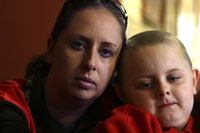Disabled Students Have to Struggle for Their Future
A new school year reveals old problems.The major U.S. Supreme Court ruling faces the problem of accommodation for special education students.

According to the ruling parents of students with special needs have the right to seek reimbursement from their districts for private school tuition, even if they did not first try their public school's special education programs.
"This is an extremely important decision," said Matthew Cohen, a Chicago attorney who specializes in disability law. "It makes it clear that school districts ... may be held legally liable for placements that the parents make on their own."
The practical effect on districts is unclear. Some educators fear the ruling will strain already cash-strapped districts and pit parents against one another as they clash over scarce resources. But it's unlikely parents will flock to private schools because they have to pay the cost, then seek reimbursement.
Still, schools should take seriously their obligations to provide services provided under the federal Individuals With Disabilities Education Act (IDEA), state officials say. Students are entitled to a "free and appropriate public education" under the law, and districts must pick up the tab for private schooling but only if the district's efforts to meet a child's needs have failed.
Special ed students receive a wide range of interventions, depending on their diagnosis. Help could be as relatively simple as speech therapy or more involved as a one-on-one aide in class or, most expensive, enrollment at a therapeutic boarding school.
Already in Illinois, 9,563 special education students attend private schools at taxpayers' expense -- more than $180 million in 2007-08, according to the Illinois State Board of Education. Chicago Public Schools is not included in the total.
Naomi Gittins, deputy general counsel for the National Association of School Boards, said the ability to go around a public school district undermines the collaborative relationship between parents and schools.
"It's too easy to say, 'I'm out of here,' "she said.
Others argue that reimbursing parents who have not given public school services a fair chance would impose an unfair financial burden, diverting funds from both special and regular education programs.
The federal government funds only 20 percent of IDEA; the remainder comes from state and local sources.
Terns out it cuts both ways. State and local resources are scarce and parents have no money for expensive education.Thus some special education advocates and parents hailed the court ruling, citing frustration with getting services they believe children need.
The result can be a child stuck in a cycle of relentless failure, said Pamela Adelman, director of the Hyde Park Day School, which serves 94 youngsters with learning disabilities.
"It can have a devastating impact on self-esteem and behavior," she said.
But even with the Supreme Court ruling, don't expect a wave of families to head for the public school exits, experts say.
Parents would have to pay up-front costs for tuition and attorneys, which are considerable, then appeal to the state to try to force unwilling districts to pick up the bill.
Only about 6 percent of cases go to a full-blown hearing. Of those, families prevail only about one-third of the time, according to the State Board of Education, Business Week reports.
Subscribe to Pravda.Ru Telegram channel, Facebook, RSS!




